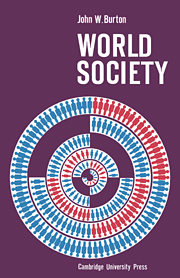1 - Why study world society?
Published online by Cambridge University Press: 14 December 2009
Summary
Why study world society? Why at schools and at universities are courses given to students who may not be employed in a foreign office or an international institution, and who may not teach, or research in, the subject? What is the educational or social value of a study of world society?
Social responsibilities
An obvious reason is that we are all citizens of the world in addition to being citizens of our immediate society. We have opportunities to elect governments that make decisions involving war and peace, economic development, human rights, our own welfare and our relationships with other peoples. We do not want these matters, which are of increasing importance, to be outside our competence. Usually foreign policy does not figure prominently at elections, and it seems to have been widely accepted that delicate matters of security and diplomacy are best left to governments and their advisers. This may be changing: many people think that foreign policies are too important for us all not to have a knowledgeable interest in them. Solutions to major problems will be found, and policies based on these solutions will be followed, only when there is a general understanding of and consensus respecting the main issues. The study of world society needs to be built into educational systems, just as is mathematics, language, health and road safety. Only then will people be able to assert their estimates of how much should be spent on defence and how much on education and health, and in this way check the judgements of political leaders.
- Type
- Chapter
- Information
- World Society , pp. 3 - 9Publisher: Cambridge University PressPrint publication year: 1972



